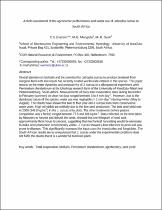 ResearchSpace
ResearchSpace
A field assessment of the agronomic performance and water use of Jatropha curcas in South Africa
JavaScript is disabled for your browser. Some features of this site may not work without it.
- ResearchSpace
- →
- Research Publications/Outputs
- →
- Journal Articles
- →
- View Item
| dc.contributor.author |
Everson, CS

|
|
| dc.contributor.author |
Mengistu, MG

|
|
| dc.contributor.author |
Gush, Mark B

|
|
| dc.date.accessioned | 2014-02-19T07:40:15Z | |
| dc.date.available | 2014-02-19T07:40:15Z | |
| dc.date.issued | 2012-12 | |
| dc.identifier.citation | Everson, C.S., Mengistu, M.G. and Gush, M.B. 2012. A field assessment of the agronomic performance and water use of Jatropha curcas in South Africa. Biomass and Bioenergy, vol. 59, pp 59-69 | en_US |
| dc.identifier.issn | 0961-9534 | |
| dc.identifier.uri | http://ac.els-cdn.com/S0961953412001432/1-s2.0-S0961953412001432-main.pdf?_tid=b9cc85ca-97cf-11e3-9292-00000aab0f26&acdnat=1392640598_40523f7062d5888bf3b23179e1221056 | |
| dc.identifier.uri | http://hdl.handle.net/10204/7221 | |
| dc.description | Copyright: 2012 Elsevier. This is the post print version of the work. The definitive version is published in Biomass and Bioenergy, vol. 59, pp 59-69 | en_US |
| dc.description.abstract | Global attention on biofuels and the potential for Jatropha curcas to produce biodiesel from marginal land with low inputs has recently created world-wide interest in this species. This paper reports on the water dynamics and productivity of J. curcas in a silvopastoral experiment with Pennisetum clandestinum at the Ukulinga research farm of the University of KwaZulu-Natal near Pietermaritzburg, South Africa. Measurements of daily total evaporation rates during DecembereFebruary (summer) on clear hot days ranged between 3 and 4 mmd 1. However, due to the deciduous nature of the species, water use was negligible (<1 mmd 1) during winter (MayeAugust). The results have shown that two- to four-year old J. curcas trees were conservative water users. High oil yields are unlikely due to the low seed production. The best seed yield was in 2009 (348.8 kg ha 1) in the J. curcas only plots. The other treatments (where pasture competition was a factor) ranged between 77.8 and 166 kg ha 1. Data collected on the time taken by labourers to harvest and dehusk the seeds, showed that 1 kg of seed took approximately 3 h to process, suggesting that mechanical harvesting would be necessary to make seed production economically viable. J. curcas showed a low tolerance to pests and was prone to diseases. This significantly increased the input costs for insecticides and fungicides. The South African results are so unequivocal that J. curcas under the experimental conditions does not fulfil the claims that it is a wonder biodiesel plant. | en_US |
| dc.language.iso | en | en_US |
| dc.publisher | Elsevier | en_US |
| dc.relation.ispartofseries | Workflow;10074 | |
| dc.subject | Biofuels | en_US |
| dc.subject | Biodiesel | en_US |
| dc.subject | Biodiesel plants | en_US |
| dc.subject | Jatropha curcas | en_US |
| dc.subject | Jatropha curcas water use | en_US |
| dc.title | A field assessment of the agronomic performance and water use of Jatropha curcas in South Africa | en_US |
| dc.type | Article | en_US |
| dc.identifier.apacitation | Everson, C., Mengistu, M., & Gush, M. B. (2012). A field assessment of the agronomic performance and water use of Jatropha curcas in South Africa. http://hdl.handle.net/10204/7221 | en_ZA |
| dc.identifier.chicagocitation | Everson, CS, MG Mengistu, and Mark B Gush "A field assessment of the agronomic performance and water use of Jatropha curcas in South Africa." (2012) http://hdl.handle.net/10204/7221 | en_ZA |
| dc.identifier.vancouvercitation | Everson C, Mengistu M, Gush MB. A field assessment of the agronomic performance and water use of Jatropha curcas in South Africa. 2012; http://hdl.handle.net/10204/7221. | en_ZA |
| dc.identifier.ris | TY - Article AU - Everson, CS AU - Mengistu, MG AU - Gush, Mark B AB - Global attention on biofuels and the potential for Jatropha curcas to produce biodiesel from marginal land with low inputs has recently created world-wide interest in this species. This paper reports on the water dynamics and productivity of J. curcas in a silvopastoral experiment with Pennisetum clandestinum at the Ukulinga research farm of the University of KwaZulu-Natal near Pietermaritzburg, South Africa. Measurements of daily total evaporation rates during DecembereFebruary (summer) on clear hot days ranged between 3 and 4 mmd 1. However, due to the deciduous nature of the species, water use was negligible (<1 mmd 1) during winter (MayeAugust). The results have shown that two- to four-year old J. curcas trees were conservative water users. High oil yields are unlikely due to the low seed production. The best seed yield was in 2009 (348.8 kg ha 1) in the J. curcas only plots. The other treatments (where pasture competition was a factor) ranged between 77.8 and 166 kg ha 1. Data collected on the time taken by labourers to harvest and dehusk the seeds, showed that 1 kg of seed took approximately 3 h to process, suggesting that mechanical harvesting would be necessary to make seed production economically viable. J. curcas showed a low tolerance to pests and was prone to diseases. This significantly increased the input costs for insecticides and fungicides. The South African results are so unequivocal that J. curcas under the experimental conditions does not fulfil the claims that it is a wonder biodiesel plant. DA - 2012-12 DB - ResearchSpace DP - CSIR KW - Biofuels KW - Biodiesel KW - Biodiesel plants KW - Jatropha curcas KW - Jatropha curcas water use LK - https://researchspace.csir.co.za PY - 2012 SM - 0961-9534 T1 - A field assessment of the agronomic performance and water use of Jatropha curcas in South Africa TI - A field assessment of the agronomic performance and water use of Jatropha curcas in South Africa UR - http://hdl.handle.net/10204/7221 ER - | en_ZA |





